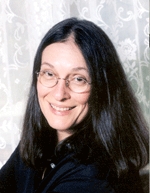
August 01, 2009
If you have trouble viewing this newsletter, set up your email options to "always allow images from this address."
Announcement
We are pleased to bring you BCQ's own series, Life Between My Pages!This series will feature a selected author each month who will share with you their personal story about how they got to where they are today.
Prepare to be completely WOWED by these writers! You've read their books, fallen in love with their style, now learn about their journey.
Each month, when the newsletter shows up in your inbox, look for the featured author's name in the subject line. Some authors you will immediately recognize, some you will not. We can assure every single author invited to participate will tell a story you won't want to miss!
AUGUST 2009: Joan Schweighardt

Until recently, whenever anyone asked me why I write I would quote the late great Susan Songtag and say I write to find out what I’m thinking. And it’s true; reading stuff I’ve written in the past definitely shines a light on where my head was at at the time. These days, however, I would say I write less to find out what I’m thinking than to influence what I think about.
While I had a few short stories and poems published when I was in my twenties and thirties, it was not until I turned forty that I had my first novel published. I was writing feverishly back then, and I had a second novel published two years after the first, and a third one a year after that. It was a glorious experience to have my lifelong dream come true—I was a published novelist!—but unfortunately, none of the three books broke out and made the kind of money one needs to actually pay the bills. By the time I got started writing my fourth novel, I had come to terms with the fact that I would probably always have a nine-to-five…well, at least a nine-to one. And as my nine-tos over the years all involved some form of writing (I was head writer for a PR agency at the time), it didn’t seem like the end of the world.
The end of the world as I knew it, however, was looming. Before I was able to find a publisher for my fourth book (a first historical novel), my then-husband and I split up and I found myself a single parent. I was making enough money to pay the bills, but just barely, and I began to wonder what the future would look like. After my ex and I sold the family house and I moved into a smaller abode with my younger son (the oldest was on his own by then), I decided to make an investment in the future, by taking my part of the proceeds from the house sale to start a publishing company. I knew full well that I was more likely to make a profit by opening a laundry mat or a pet-sitting service, but I thought that if I could combine my love of books with my need to make money, passion would trump common sense and everything would fall into place.
In fact, starting a publishing company single-handedly with almost no money or time was one of the most rewarding things I ever did. It was extremely challenging and forced me to refine aspects of myself I hadn’t even known existed. I had once thought of myself as the shyest person on the planet, and now here I was on the phone each day with distributors, sales reps, printers, cover artists, trade show organizers, and of course authors. And I was still working for the PR agency, albeit as a freelancer. In the end, I couldn’t generate enough money to compete with the big boys (the fate of many small indie publishers), but in the seven years I owned GreyCore Press, I published several award-winning books, including a Barnes and Noble “Discover Great New Writers” selection and a ForeWord Magazine “Editors Choice Book of the Year.” And all my authors were well reviewed and interviewed in print and on radio and TV. Profit margins aside, I consider my foray into publishing a huge success.
But what happened to my fiction writing in the meantime?
Frankly, soon after I started publishing I lost my fiction head—which is the equivalent of a sailor spending so much time on land that she loses her sea legs. I started a few efforts here and there, but I found it impossible to “think like a fiction writer” while I was simultaneously thinking about paper stock and production deadlines. I found a publisher for my historical novel, and I did manage to make the changes my editor requested, but that was about all I could muster. I didn’t know if I would ever get my sea legs back, and I couldn’t very well sail into the world of fiction without them.
I stopped publishing in 2005 and since then have made my living doing virtually the same thing I did before but without the overhead. I edit, publicize and sometimes even sell the work of other writers. I also do a lot of ghostwriting. I did manage to write a memoir over the last few years, but that seemed easy as it didn’t require me to invent anything new. When people asked me if I missed writing fiction, I would say—and I was being absolutely honest—that I didn’t, that it was almost as rewarding to be working with writers as it was to be writing myself.
Nevertheless, I forced myself to start a novel, my first in years, about a year ago. Because I have had so much freelance work, I worked on it maybe six hours a month; my writing sessions were so infrequent that I had to spend half of them reading from the beginning to see where I left off and what the heck I had been writing about in the first place. It was not a satisfying experience.
But only in the last month, because it is summer and also maybe because of the economy, I have had less freelance work than usual. So I have been spending more time with my novel. And only a few weeks ago, it happened—I got my sea legs back, my fiction head! Out of nowhere. Now I hear my characters voices when I am in the shower, or driving the car or doing the dishes. I find myself making notes about things I want to remember on the backs of the post office receipts that accumulate in my bag. It’s a thrill to be in this altered state. I had forgotten what it was like. I had forgotten how important it was to my well being.
My life is full of problems large and small—just like most people. And because some of these problems are ongoing and have no obvious solutions, I sometimes find myself investing time and energy in negative or circular thinking. Exercise, meditation and good times with loved ones help enormously—but they are not lifelines. Writing fiction is, for me at least. Now that I am past the point of no return with my novel, I don’t have room in my head for negative thoughts. The problems are still there and I still have to think about them. But I just don’t have the space to devote to them that I did before. Precedence goes to my characters.
This is the creative process. It is a gift for which I am eternally thankful. It doesn’t matter whether my new novel makes any money or not. It doesn’t even matter whether or not it gets published. It only matters that I’ve recaptured something I thought I had lost, and for now at least, the wind is at my back.
Joan Schweighardt is the author of the novels Gudrun’s Tapestry, Virtual Silence, Homebodies and Island.
Find these books on Amazon
Have a friend who would enjoy Book Clubbers?
We would be honored for you to share our newsletter with any book lover you know!
Are you reading this on a recommendation?
If you like what you see, come
sign up
with us! It's quick, easy, and free!